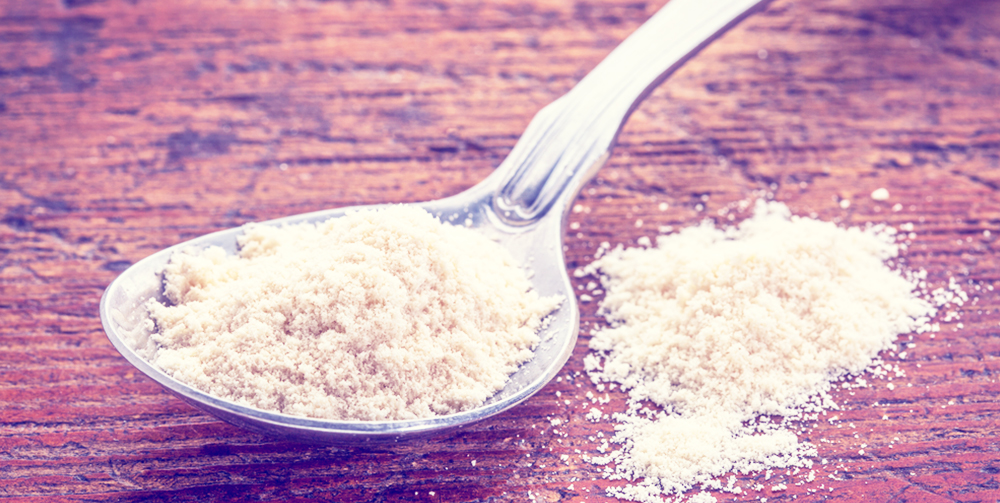In 1985 my uncle in the NSW south coast town of Tilba used whey to feed back to his cows as extra nutrition and at the time one of my colleagues and I were looking at using whey as a new food for fish farming. It was formed in copious quantities during cheese manufacture and was viewed as a cheap waste product.
Whey as a Health Food
How times have changed. Whey is now separated into protein concentrates, isolates and hydrolysates and is in high demand by the health industry. It is especially popular as a supplement for weight loss, where high levels of branched chain amino acids in the whey protein are known to induce a significant loss of body fat while preserving lean muscle mass.[1]
Whey is also used to lower total and LDL cholesterol and to reduce blood pressure in hypertensive patients.[2]
In asthma patients whey protein has been linked to an improved cytokine response.[3]
And currently, whey protein is being used as a cysteine donor for the modulation of glutathione (GSH) in cancer treatment.[4]
Precursors for Glutathione
Animal studies have consistently shown that whey proteins are superior to other dietary proteins for the suppression of tumour development. This is thought to be due to the high quantity of cystine/cysteine and gamma-glutamylcyst(e)ine dipeptides in the whey protein subfractions. These include alpha lactalbumin, bovine serum albumin (BSA) and lactoferrin (which may also be acting as an efficient iron chelator).[5]
In BSA there are 17 cysteine residues and 6 glutamylcystine (Glu-Cys) dipeptides; in lactoferrin 17 cystine residues and 4 Glu-Cys dipeptides; and in alpha lactalbumin 4 cystine residues. In particular, the Glu-Cys dipeptides very readily enter the cell to be synthesised into GSH, a tripeptide composed of cysteine, glutamic acid and glycine.[6]
A Role for Glutathione in Cancer
The fact that cysteine is the limiting amino acid for the production of intracellular glutathione (GSH) is what makes whey protein such an interesting potential dietary adjunct for cancer patients. Through its associated enzymes, GSH has a major role, in cell protection against free radicals, ionising radiation, reactive oxygen species and carcinogens.[7]
After feeding with dietary whey protein there is an increased level of GSH in serum and tissues. This is accompanied by enhanced lymphocyte proliferation, phagocytosis, natural killer cell activity, T-helper and cytotoxic T cell activity. The lactoferrin component of the whey protein facilitates apoptosis, inhibits angiogenesis and boosts carcinogen-metabolising enzymes.
It is most interesting to note that cancer cells and normal cells react differently to nutrients and drugs that affect GSH status. Research has shown that rapidly growing cancer cells have a higher level of GSH synthesis than the normal cells that surround them. Furthermore, depletion of tumour GSH has been found to decrease the rate of cellular proliferation and inhibit tumour growth. The reason for this is not yet clear, but perhaps the increase in GSH in the rapidly growing cancer cell may be the body’s response to the appearance of carcinogens and the accumulation of reactive oxygen species. More research is needed.
Given what we do know, our current question should be how do we selectively lower the GSH in the tumour while increasing the levels of GSH in healthy cells? One answer is that depletion of GSH can be facilitated by feeding whey protein. The most likely mechanism is an increase in the efflux of GSH out of the mitochondria with a simultaneous inhibition of its accumulation. The result is an overall depletion of GSH in the mitochondria in cancer cells.[7]

GSH depletion in Cancer Cells
As mentioned, clinical trials are still few and far between but one interesting phase I-II clinical study using a specially prepared whey protein concentrate (Immunocal) was able to demonstrate GSH depletion and inhibition of proliferation in human breast cancer cells:
“On the basis of this information five patients with metastatic carcinoma of the breast, one of the pancreas and one of the liver were fed 30 grams of this whey protein concentrate daily for six months. In six patients the blood lymphocyte GSH levels were substantially above normal at the outset, reflecting high tumour GSH levels. Two patients (#1, #3) exhibited signs of tumour regression, normalization of haemoglobin and peripheral lymphocyte counts and a sustained drop of lymphocyte GSH levels towards normal. Two patients (#2, #7) showed stabilisation of the tumour, increased haemoglobin levels. In three patients (#4, #5, #6,) the disease progressed with a trend toward higher lymphocyte GSH levels. These results indicate that whey protein concentrate might deplete tumour cells of GSH and render them more vulnerable to chemotherapy”[8]
This makes whey protein a very interesting adjunctive food because it dampens tumour growth and makes the tumour more susceptible to chemotherapy, while at the same time protecting the body’s healthy cells.
GSH in Cancer Prevention
This also makes sense when it comes to prevention. Whey protein may be able to furnish healthy cells with enough GSH to enable them to control the impact of any stray carcinogens or ROS before they have morphed into rapidly proliferating cells or a virulent tumour load.
A good example is the protection against oxidant-induced cell death in human prostate epithelial cells treated with 500mg/mL hydrolysed whey protein isolate (WPI). Intracellular GSH was increased 64% compared to control cells receiving no WPI. The same increase in GSH was also observed with acetylcysteine (500microM), a cysteine-donating compound known to elevate intracellular GSH. Hydrolysed sodium caseinate at the same dose did not increase GSH.[9]
At this stage research is limited but it appears that whey protein is likely to be a food that offers protection of healthy cells against adverse proliferative changes. It also facilitates the reduction of GSH in cancer cells, thus slowing growth and making the cells more vulnerable to chemotherapy while optimising overall immune function.
References
- Frestedt JL, Zenk JL, Kuskowski MA, et al. A whey-protein supplement increases fat loss and spares lean muscle in obese subjects: a randomized human clinical study. Nutr Metab (Lond) 2008;5:8. [Full text]
- Fluegel S. Blood pressure lowered by whey supplements, Medical News Today 2010. Viewed 24 September 2015, http://www.medicalnewstoday.com/releases/210886.php
- Lothian JB, Grey V, Lands LC. Effect of whey protein to modulate immune response in children with atopic eczema. Int J Food Sci Nutr 2006;57(3-4):204-211. [Abstract]
- Bounous G. Whey protein concentrate (WPC) and glutathione modulation in cancer treatment. Antcancer Res 2000;20(6C):4785-4792. [Abstract]
- Parodi PW. A role for milk proteins and their peptides in cancer prevention. Curr Pharm Des 2007;13(8):813-828. [Abstract]
- PDR Information. Immunotec 2015. VIewed 24 September 2015, http://www.immunotec.com/d2012_science_pdr.wcp
- Ortega AL, Mena S, Estrela JM. Glutathione in cancer cell death. Cancers 2011;3(1):1285-1310. [Full text]
- Kennedy RS, Konok GP, Bounous G, et al. The use of a whey protein concentrate in the treatment of patients with metastatic carcinoma: a phase I-II clinical study. Anticancer Res 1995;15(6B):2643-2469. [Abstract]
- Kent KD, Harper WJ, Bomser JA. Effect of whey protein isolate on intracellular glutathione and oxidant-induced cell death in human prostate epithelial cells. Toxicol In Vitro 2003;17(1):27-33. [Abstract]
DISCLAIMER:
The information provided on FX Medicine is for educational and informational purposes only. The information provided on this site is not, nor is it intended to be, a substitute for professional advice or care. Please seek the advice of a qualified health care professional in the event something you have read here raises questions or concerns regarding your health.


